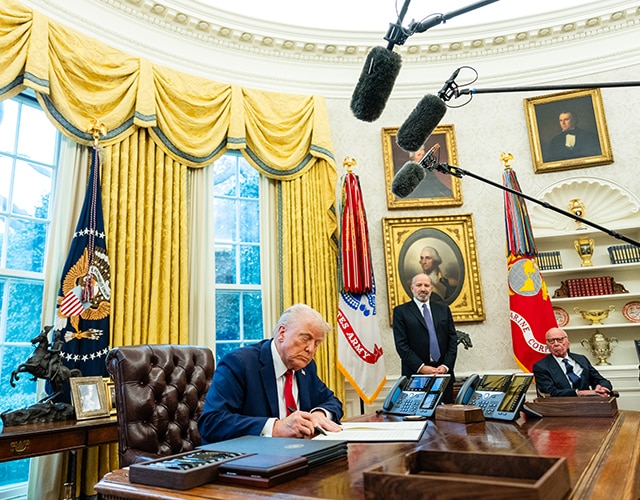The opening weeks of President Donald Trump’s second term have cast America’s campuses into turmoil, with upheaval that threatens to erode the financial foundation of higher education in the United States.
As the administration orders the end of diversity programs and imposes cuts to foreign aid, university presidents and their lawyers fear that millions of dollars in federal funding could ultimately vanish. Some research projects, including many connected to the U.S. Agency for International Development, have been suspended, and program directors have made plans for layoffs.
But universities have largely been quiet. Professors and administrators alike seem wary of provoking a president who has glorified retribution and has already started to tighten the funding spigot. Staying out of the spotlight, some reason, is prudent.
Those who have spoken have often relied on carefully calibrated letters and statements, noting that they are watching but hardly offering any overt opposition. In some instances, researchers and campus leaders have been pressured into silence by a government that has demanded they not speak to reporters as money remains bottled up.
“It’s a hard time, and it’s an uncertain time, and the combination is nearly paralyzing,” said Ted Mitchell, the president of the American Council on Education, which counts more than 1,600 colleges and universities in its membership.
The uncertainty, Mitchell said, has created “reluctance to speak out for fear of repercussions,” a phenomenon he described as “a rational fear.”
The White House’s threat last week to freeze trillions of dollars in federal grants and loans posed a major risk to universities, though the plan’s legal fate has been thrown into doubt. Other orders, like ones suspending foreign aid and insisting that federal money not go toward diversity, equity and inclusion work, are still convulsing campuses.
On the campaign trail, Trump and others now in his administration crusaded against a cadre of preeminent schools, despite the president being an alumnus of the University of Pennsylvania and Vice President JD Vance holding a law degree from Yale University. But the early policy pushes are striking at campuses far beyond the Ivy League.
That includes public research universities that are the pride of many state systems and that are, in some cases, integral to the Feed the Future initiative at USAID. The project promotes global food access. USAID grants have also gone to promote democracy, human rights and good governance.
Lawmakers, aides and some aid agency employees say that it appears the Trump administration plans to dismantle USAID and put it under the State Department. The USAID website has been offline since Feb. 1. A visit to its pages shows a message about its direct hire personnel being placed on administrative leave.
USAID’s Feed the Future program is built around “innovation labs” at universities in the United States, many of them juggernauts in red states, like the University of Georgia and Mississippi State University. The program, which has spent billions over the years, has effectively been on hiatus as Trump administration officials conduct a broad examination of U.S. aid abroad.
“Reviewing and realigning foreign assistance on behalf of hardworking taxpayers is not just the right thing to do, it is a moral imperative,” Tammy Bruce, the State Department spokesperson, said in a statement announcing the pause. The department claimed last week that it had already “prevented” at least $1 billion in “spending not aligned with an America First agenda.”
University Response
As the administration trumpets the closing of the nation’s checkbook, universities have hardly harnessed their own bully pulpits. Despite outrage over campus protests, tuition levels, and particular professors and courses buffeting the higher education industry, many individual universities retain enormous sway and goodwill in their communities and states.
For now, though, schools seem to be reluctant to try to tap into that. Mississippi State, which leads a Feed the Future Innovation Lab for Fish under a $15 million grant, declined to comment. A spokesperson for the state’s higher education board said officials were “aware of the temporary pause” and would “continue to monitor this directive.”
And the University of Georgia, home to the Feed the Future Innovation Lab for Peanut, similarly referred an inquiry about the pause in aid to the state’s higher education system. The system, led by Sonny Perdue, Trump’s agriculture secretary during his first administration, did not respond to an interview request.
An inquiry to USAID about claims that it had directed researchers to avoid speaking to the news media went unanswered. The agency, founded in 1961, has become a cauldron of worry as top officials have been placed on leave and Elon Musk, who is seeking to cut $1 trillion in federal spending, declared that the administration would close it. (It is not clear whether Trump or Musk have such authority.)
On Monday, after agency employees assigned to the Washington headquarters were told to stay home from work, Secretary of State Marco Rubio said that he was serving as the agency’s acting administrator.
Some of the silence and hesitancy from campuses stems from confusion. In recent days, university lawyers have scrambled to decipher terse stop-work orders, in part to determine whether schools can use their own money to continue research projects that had been receiving federal support.
If legal, such an option might be financially feasible for only some universities. Federal dollars are seen as the only practical, long-term option for most projects that have relied on backing from Washington.
In the 2023 fiscal year, the federal government gave universities almost $60 billion for research.
During a faculty senate meeting that was streamed online Monday, Jennifer L. Mnookin, the chancellor of the University of Wisconsin-Madison, urged professors to “hold off” on optional expenses so the university could help ensure that “you’re making smart choices.”
“The transition has created for us an enormous amount of uncertainty, combined with fast-moving and changing information,” she said. “It’s generated some potentially quite significant threats to important aspects of our mission, as is true for our peer institutions nationally.”
Universities across the country are for now using a subtle playbook to try to stave off funding losses: beseeching their congressional delegations to intervene, and sometimes deploying Republican-aligned lobbyists across Washington.
“These are different times,” said former Sen. Trent Lott, R-Miss., who became a lobbyist after he left the congressional leadership. “I’m sure everybody is trying to figure out how it’s going to play out and what they need to do. Different team in town, and people are going to have to figure out how to deal with it.”
Schools braced for changes after Trump’s election, including to the nation’s academic research landscape. The first weeks of the new administration have nevertheless been jarring, said Jeffrey P. Gold, the president of the University of Nebraska.
“The abruptness and the scale of the messaging have been the largest elements of surprise,” he said in an interview, adding that the outcomes of many projects could be harmed if more delays and cuts materialize.
Some critics of Trump’s budget-cutting ambitions have tried to borrow language from the administration’s rhetoric to make their points.
Mark Becker, the president of the Association of Public and Land-grant Universities, said the possible end of USAID support for research risked the nation’s stature and competitiveness abroad.
<em>“</em>We urge the administration to resume the critical work of USAID to assure American prosperity and security,” he said. “It is by empowering our nation’s scientists to tackle global challenges that we will secure U.S. leadership for decades to come.”
Becker is one of the few academic leaders applying such explicit public pressure against a specific set of potential cuts.
But congressional Democrats have assailed the chaos that they say the administration has unleashed in higher education.
Rep. Nikki Budzinski, a Democrat whose district includes the University of Illinois Urbana-Champaign, said she had been “in regular contact with the university since the freeze and, now, the miscommunication about the freeze.”
“It’s really, truly creating panic across the board,” she added. In a statement, the university said its Soybean Innovation Lab, which works to improve agriculture in 31 countries, was notified recently that funding had been paused. It has received more $50 million since 2013.
Republicans expect that voters, especially in conservative states, will have some tolerance even for cuts that affect their communities.
“Probably most Nebraskans are in favor of looking for greater efficiencies,” said Tom Osborne, a Republican who coached the University of Nebraska’s football team to three national championships and later served three terms in Congress. “But sometimes it can pinch a little bit here and there.”
Osborne predicted that changes to some programs would probably go unnoticed by many voters.
“Looking at the papers and talking to people here,” he said, “I have not heard a whole lot of conversation about it.”
But the consequences already feel acute at some campus offices. At Iowa State University, the compensation of at least 11 people is tied, to some degree, to a USAID grant that promotes curriculum modernization in Kosovo and that grew out of a decade-old “sister-state” partnership between Iowa and Kosovo.
“We are not to put forth any efforts on these activities,” said Curtis R. Youngs, a professor in the Department of Animal Science who works on the project.
The grant is worth $4 million over five years. “By USAID standards, that’s not a huge grant,” Youngs said. “But it’s a sizable grant from our perspective.”
c.2025 The New York Times Company. This article originally appeared in The New York Times.







